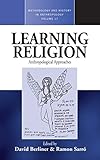Learning Religion : Anthropological Approaches / ed. by Ramon Sarró, David Berliner.
Material type: TextSeries: Methodology & History in Anthropology ; 17Publisher: New York ; Oxford : Berghahn Books, [2007]Copyright date: ©2007Description: 1 online resource (248 p.)Content type:
TextSeries: Methodology & History in Anthropology ; 17Publisher: New York ; Oxford : Berghahn Books, [2007]Copyright date: ©2007Description: 1 online resource (248 p.)Content type: - 9781845453749
- 9781782382133
- 207/.5 22/eng/20231120
- BL256
- online - DeGruyter
| Item type | Current library | Call number | URL | Status | Notes | Barcode | |
|---|---|---|---|---|---|---|---|
 eBook
eBook
|
Biblioteca "Angelicum" Pont. Univ. S.Tommaso d'Aquino Nuvola online | online - DeGruyter (Browse shelf(Opens below)) | Online access | Not for loan (Accesso limitato) | Accesso per gli utenti autorizzati / Access for authorized users | (dgr)9781782382133 |
Frontmatter -- Contents -- Acknowledgements -- 1. On Learning Religion: An Introduction -- 2. Learning to Believe: A Preliminary Approach -- 3. Menstrual Slaps and First Blood Celebrations: Inference, Simulation and the Learning of Ritual -- 4. The Accidental in Religious Instruction: Ideas and Convictions -- 5. On Catching Up With Oneself: Learning to Know That One Means What One Does -- 6. How Do You Learn to Know That it is God Who Speaks? -- 7. How to Learn in an Afro-Brazilian Spirit Possession Religion: Ontology and Multiplicity in Candomblé -- 8. Learning to be a Proper Medium: Middle-Class Womanhood and Spirit Mediumship at Christian Rationalist Séances in Cape Verde -- 9. Copyright and Authorship: Ritual Speech and the New Market of Words in Toraja -- 10. Learning Faith: Young Christians and Catechism -- 11. What is Interesting about Chinese Religion -- 12. The Sound of Witchcraft: Noise as Mediation in Religious Transmission -- Bibliography -- Notes on Contributors -- Index
restricted access online access with authorization star
http://purl.org/coar/access_right/c_16ec
As we enter the 21st century, it becomes increasingly difficult to envisage a world detached from religion or an anthropology blind to its study. Yet, how people become religious is still poorly studied. This volume gathers some of the most distinguished scholars in the field to offer a new perspective for the study of religion, one that examines the works of transmission and innovation through the prism of learning. They argue that religious culture is socially and dynamically constructed by agents who are not mere passive recipients but engaged in active learning processes. Finding a middle way between the social and the cognitive, they see learning religions not as a mechanism of “downloading” but also as a social process with its relational dimension.
Mode of access: Internet via World Wide Web.
In English.
Description based on online resource; title from PDF title page (publisher's Web site, viewed 25. Jun 2024)


